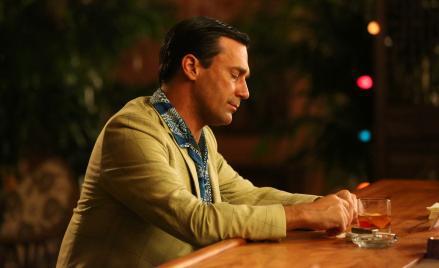Hanna, Paul:
Mad Men Season 6 begins with a POV shot. We’re looking through the eyes of a dying man. A doctor pounds on our chest, imploring us to “hang in there,” but the screen goes black. When we fade back in we’re on a sunny beach in Hawaii (is this heaven?) being read to from Dante’s Inferno (is this hell?).
Death and its portents were everywhere in tonight’s episode—from Jonesy the doorman’s heart attack; to little Bobby likening a violin case to a coffin; to Roger Sterling’s mother and shoeshine guy passing away in the same week; to Don pitching a luxury beachside resort by imagining a man vanishing into the waves. “Heaven’s a little morbid,” insists Don to the Sheraton guys. “How do you get to heaven? Something terrible has to happen.”
Were we meant to think Don was in heaven at the Royal Hawaiian? That water looked inviting, that luau looked tasty, that bud looked kind, and Megan’s bikini looked scrumptious. And though he appeared in nearly every scene, Don uttered not a single word for the about the first seven minutes of the episode—which must have felt like a little slice of heaven for the famously ineffusive Mr. Draper. Doesn’t seem like hell, anyway.
“What did you see when you died,” a drunk Don pestered Jonesy later in the episode. “Was it like a hot, tropical sunshine?” I was struck by all the references to temperature tonight. The Sheraton exec mentions the shock of returning from Hawaii in frosty wintertime. The talisman trailing Don through the episode is a lighter, while Roger’s daughter asks him to invest in refrigeration technology. There are references to food and coffee going cold. And then the clincher: “I’d so rather be hot than cold,” says one of those drifter kids to Betty as they stand in a squalid kitchen on St. Marks Place.
Inferno readers will recall that Dante’s innermost circle of hell is not flames, but ice. And I couldn’t help but notice the juxtaposition of Don and Megan eating delicious pork in balmy Hawaii against those lost souls in their unheated East Village squat unwrapping raw, foul-looking pig butt. Or again: the Drapers’ cozy fondue party high atop their apartment building, followed by Don’s descent down to the chilly basement to find Dr. Rosen’s skis (and then plough his wife—beneath a crucifix, no less).
But now I’ll hit pause on the armchair lit-crit to simply marvel at how entertaining—if dark—this premiere was. Sure, we didn’t get much in the way of Sally Draper developments, and didn’t spend a lot of time with Joan or Pete. But I was riveted by the strong focus on Don and Peggy, who have always been the twin planets at the center of the Mad Men universe. Self-made, burdened with secrets, smarter than everyone around them.
I loved (if you’ll allow me to devalue the word) Peggy’s no-nonsense workplace authority. She’s the adult, surrounded by kids—be they her adenoidal underlings flailing around as they try to salvage the Koss Super Bowl spot, or her longhair boyfriend Abe rocking out in headphones as she attempts to get some work done. Peggy is at the top of her game. Lucky for her, her boss knows it.
Meanwhile, Don struggled through another so-so pitch meeting. How many more misfires before Ginsberg gets trotted out as SCDP’s new rock-star ideas guy? The rest of the creatives are growing facial hair and smoking reefer in the office—even accounts guys like Pete and Roger are sporting sideburns, however neat and well-tended—yet Don dresses and grooms himself pretty much exactly like he did in 1960.
Speaking of the march of time: We now know that this episode starts in December 1967, and ends in the early hours of New Year’s Day, 1968. “World Bids Adieu To a Violent Year; City Gets Snowfall” reads the headline on the copy of the New York Times that Don finds at his door when he slinks home after cheating on Megan. Oh man, if they thought 1967 was violent … And the episode hinted at the coming brutality. We heard about those soldiers making necklaces of severed ears. But there was also the East Village drifter looking for an “Army knife” to slice up that pig flesh, Pfc. Dinkins describing what his weaponry could do to a water buffalo, and Betty bizarrely offering to hold down a 15-year-old girl’s arms so Henry Francis could rape her.* Among the 1968 historical events I listed in my last entry, I neglected to mention that My Lai will happen in March.
Hanna, you noted that when Don cheated on Betty, we could chalk it up to garden variety suburban ennui, but cheating on Megan would suggest a man who is “constitutionally incapable of love and happiness.” Recall that in the very first episode of Mad Men, back in Season 1, the big reveal at the end of the show was that Don (whom we’d seen hound-dogging around Manhattan like an untethered bachelor) actually had a wife and kids hidden away in Ossining. This time, the ploy is reversed: Don seems stable, almost blissfully domestic, with Megan—until those final moments in which we learn that he’s getting busy with Linda Cardellini. Is monogamy, or even happiness, just not his bag?
This is MY funeral,
Seth
Correction, April 8, 2013: This post misidentified Betty’s husband. His name is Henry Francis, not Dick Francis. (Return to the corrected sentence.)
Hanna Rosin and Seth Stevenson will be chatting with readers about the Mad Men premiere at noon on Slate’s Facebook page.
